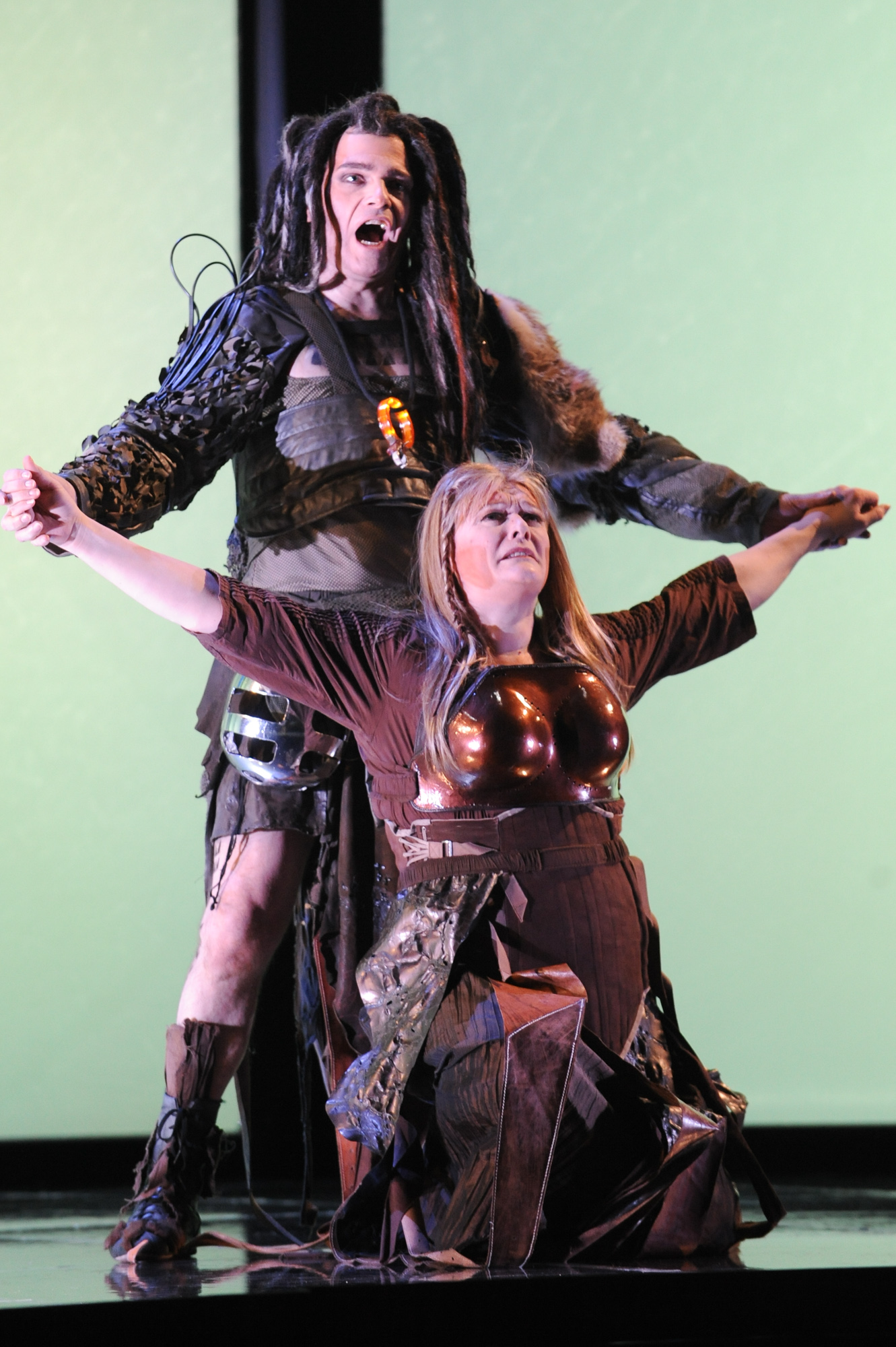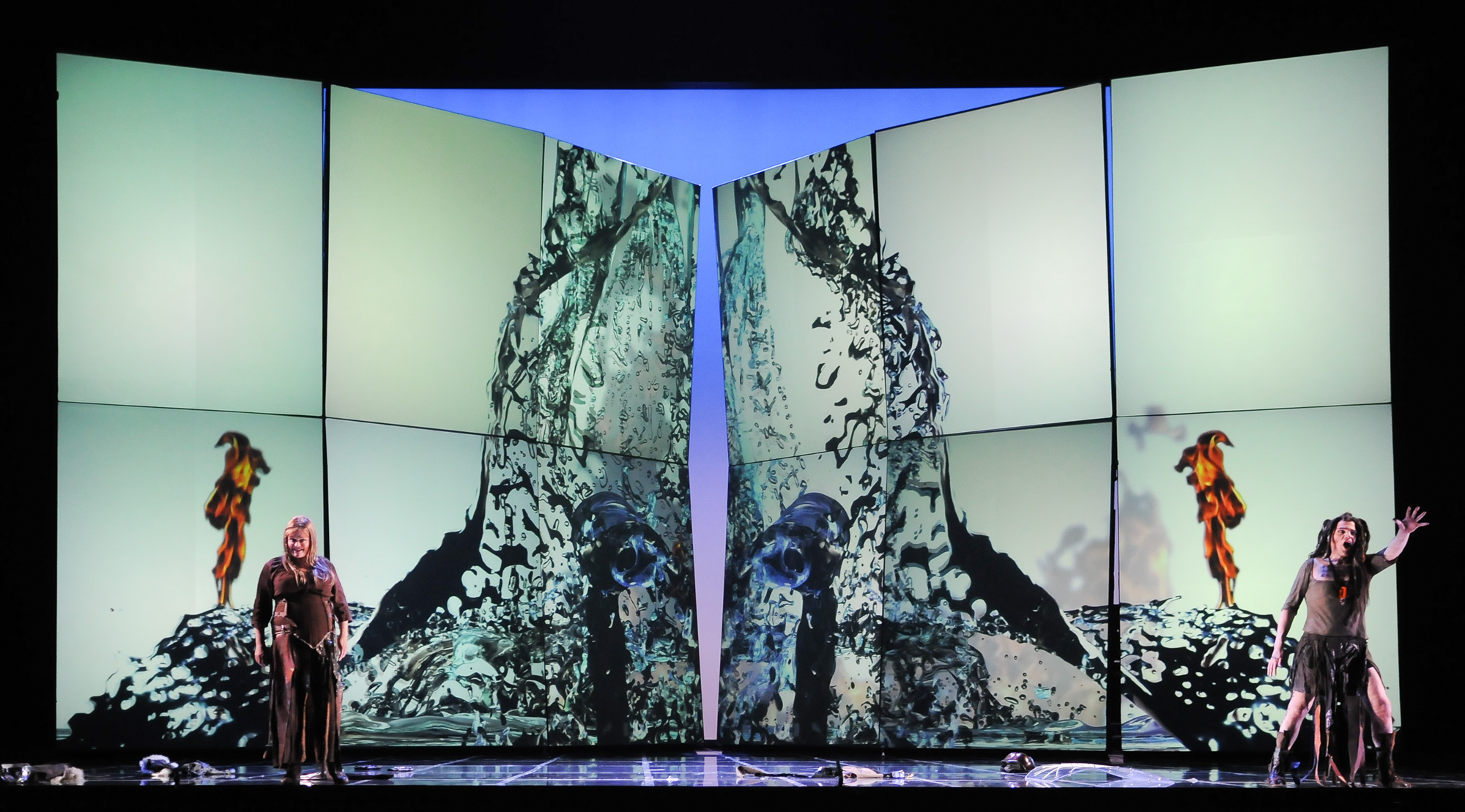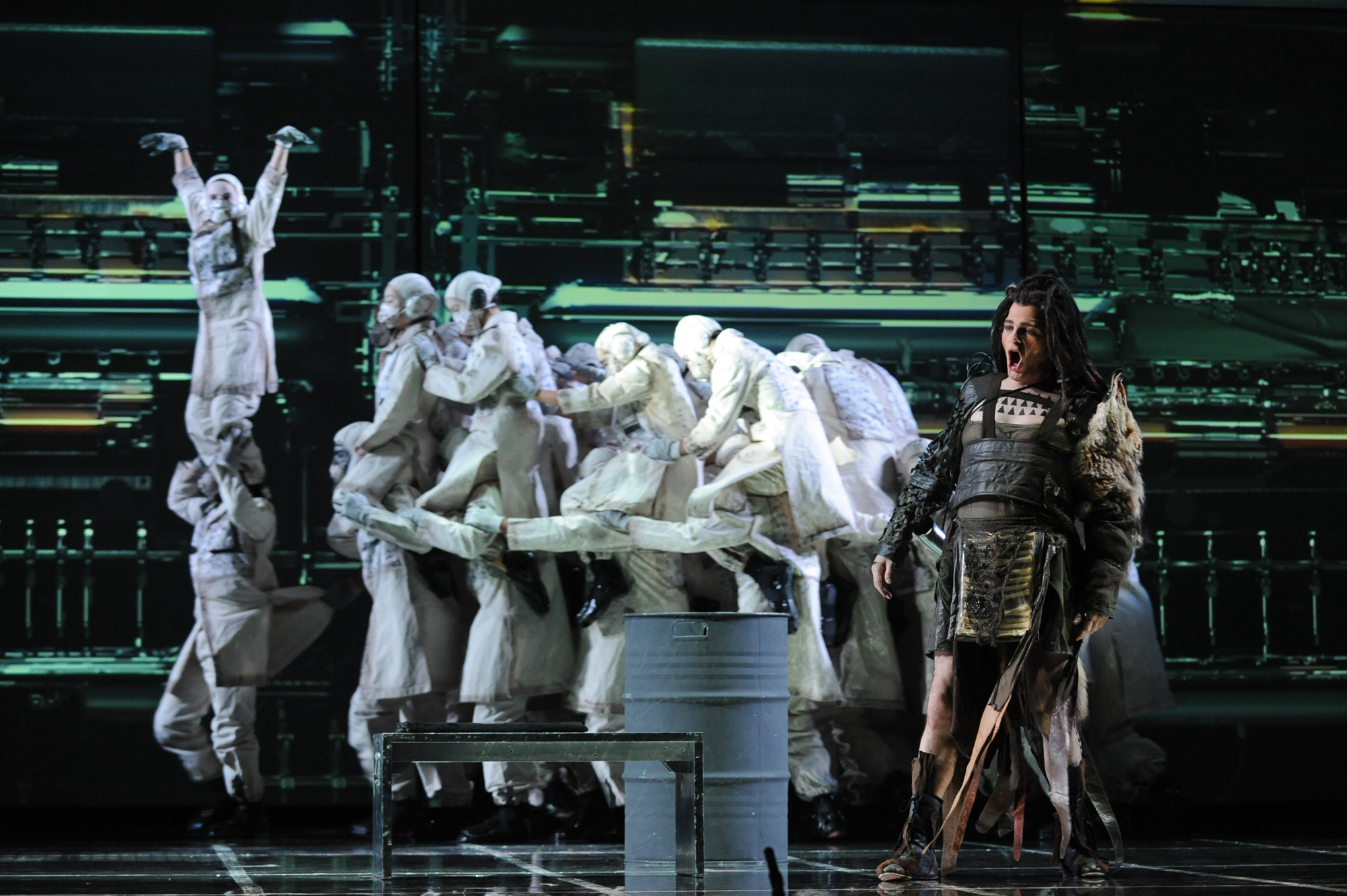Siegfried
Act I
The dwarf Mime tries unsuccessfully to forge a sword for his foster son, Siegfried. He hopes Siegfried will use the sword to kill the dragon Fafner, who guards the marvelous treasure stolen from Mime’s brother, Alberich. Mime wants the treasure for himself, particularly the gold ring that gives the wearer power over all the earth.
Every sword Mime forges breaks like a toy in Siegfried’s hands, however. The dwarf knows that only the sword left to Siegfried by his deceased mother will be strong enough to accomplish his purpose, but it has been shattered into pieces and Mime’s skills are insufficient to reforge it.
Because he bears no resemblance to Mime, Siegfried knows the dwarf cannot be his natural father. Siegfried begins to question Mime about his true parentage, and the dwarf tells him for the first time how he found his mother, Sieglinde, in the woods, and how she died giving birth. As proof of his truthfulness, Mime shows him the shards of the sword Nothung, which Sieglinde told him had belonged to Siegfried’s father.
Siegfried demands that Mime reforge the sword and leaves the dwarf in despair. A stranger approaches-it is Wotan, the chief of the gods, in human disguise as the Wanderer. He challenges Mime to a contest of wits in which the loser will forfeit his life. They each ask three questions of the other, and when Mime is unable to answer the Wanderer’s third question, “Who will repair the sword Nothung?,” the Wanderer reveals that someone who has never learned fear will repair the sword, and the same person will take Mime’s life. Mime knows that the Wanderer is speaking of Siegfried.
When Siegfried returns, expecting to find Nothung repaired, Mime tells him frankly that he is unable to do it. He suggests a visit to Fafner’s lair, hoping to teach the boy to fear. Siegfried triumphantly reforges the sword himself and goes with Mime to confront Fafner. Mime brings along a poisonous drink, which he plans to give Siegfried after the youth has killed Fafner.
Act II
Alberich hides near Fafner’s lair, keeping watch and hoping to regain his treasure. The Wanderer arrives and warns him of Mime’s designs on the gold. The Wanderer wakes Fafner to tell him that a young hero is coming to kill him, but Fafner is unconcerned and goes back to sleep.
Mime describes the terrifying dragon to Siegfried in hopes of instilling fear in the youth-to no avail. Siegfried sends Mime away and, entranced by the sound of a songbird, he tries to imitate its song on a reed pipe. Since he is unsuccessful with the pipe, he blows his horn instead and awakens Fafner. The dragon emerges and Siegfried plunges Nothung through his heart. When Siegfried accidently touches a drop of Fafner’s blood to his lips, he is suddenly able to understand the song of the bird, which directs him to the dragon’s gold. When he goes into the dragon’s den, Alberich and Mime quarrel outside over the treasure. When Siegfried comes out with the ring and the Tarnhelm- a magic helmet that can make the wearer invisible or change into any shape or size-Mime offers him the poisoned drink, but a Woodbird warns him of the dwarf’s intentions. Siegfried refuses the drink and kills Mime. The Woodbird tells Siegfried that she will lead him to a beautiful woman: Brünnhilde, his destined bride, asleep amid a ring of fire.
Act III
Wotan summons Erda, goddess of the earth, to ask how to prevent the gods’ seemingly inevitable downfall, but she is unhappy to have her slumber interrupted and advises him to seek the counsel of the Norns or of their daughter, Brünnhilde. Angry at the very mention of Brünnhilde, he consigns Erda to sleep endlessly in the earth; he now pins his hopes for the future on Siegfried.
On his way to find Brünnhilde, Siegfried encounters the Wanderer, who appears to be an ordinary old man. The Wanderer peppers Siegfried with questions about his sword and finally tells the youth he shattered it himself with his spear. Siegfried naturally assumes the Wanderer killed his father, and he smashes the old man’s spear with his sword. Defeated, the Wanderer gathers the fragments of his spear.
Siegfried reaches the mountaintop, bursts through the flames, and awakens Brünnhilde. Having never before seen a woman, he is astonished at her beauty. She is elated to have been awakened by the hero she had hoped for-the son of Siegmund and Sieglinde. Brünnhilde accepts her fate as a mortal and welcomes Siegfried as her husband.
Music Richard Wagner
Conductor Zubin Mehta
Set La Fura dels Baus
Zubin Mehta conductor
Carlus Padrissa director
Franc Aleu video
Roland Olbeter sets
Chu Uroz costumes
Peter van Praet lights
Siegfried Lance Ryan
Brünnhilde Jennifer Wilson
Der Wanderer Juha Uusitalo
Mime Ulrich Ress
Alberich Franz-Josef Kapellmann
Erda Catherine Wyn-Rogers
Fafner Stephen Milling
Der Waldvogel Chen Reiss
Siegfried, son of Siegmund and Sieglinde (Tenor)
Mime, Alberich’s brother (Tenor)
The passer (bass-baritone)
Alberich, Nibelung (bass-baritone)
Fafner, Giant (Bass)
Erda, goddess (Soprano, Alto)
Brünnhilde, Valkyrie (Soprano)
The forest bird voice (Soprano, Alto)
The third opera in Wagner’s epic Ring cycle, Siegfried stands on its own as great spectacle, masterful storytelling, and electrifying music.
The conniving dwarf Mime has raised the naïve and fearless boy Siegfried in hopes that he will obtain the all-powerful ring and turn it over to him. But with the help of a mysterious Wanderer—the god Wotan in disguise— Siegfried reforges his father’s powerful sword and uses it to claim the ring for himself. The balance of power is changing: the power of the gods continues to diminish as Siegfried’s journey culminates in the discovery of his destined bride, Brünnhilde.
A co-production of Palau de les Arts Reina Sofia, Valencia, and Maggio Musicale, Florence









